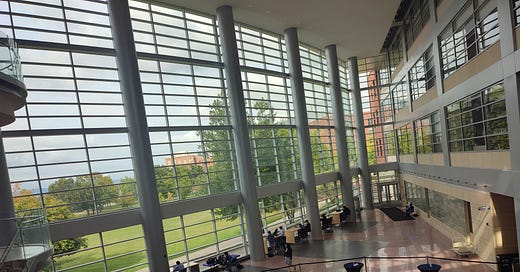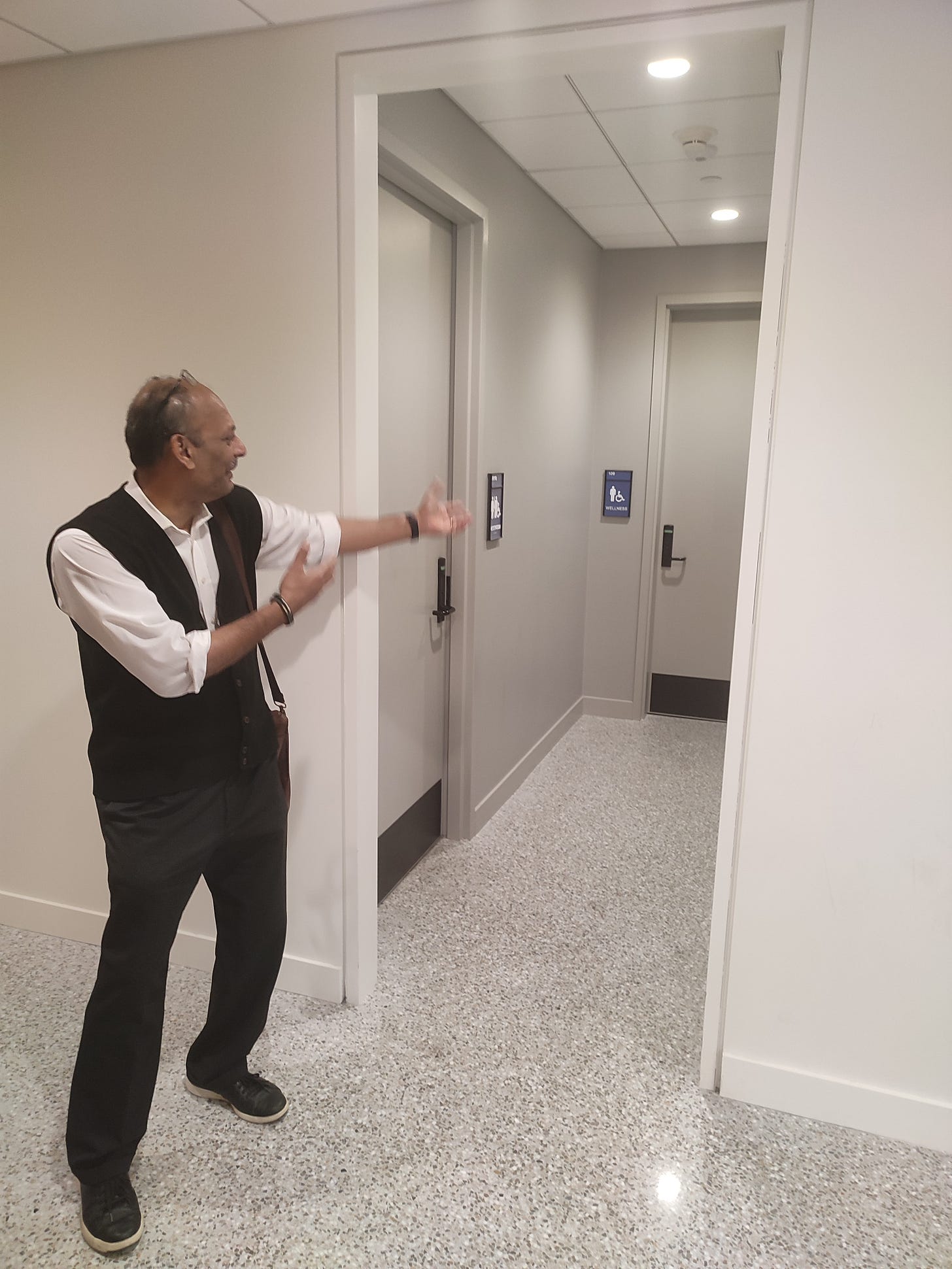I woke up this morning in Washington, DC, and I’m finishing up this mail on a train that is most of the way to Boston. If you know people who should join me somewhere along this tour, then let them know that I’ll be talking with Lewis Hyde in Boston tomorrow night (9/20), then with
and friends in Burlington, VT on Sunday (9/22), with M.R. O’Connor, author of the remarkable Ignition: Lighting Fires in a Burning World in New York City on Monday (9/23) and finally with Suparna Choudhury and Li Sumpter at Haverford College, PA on Tuesday (9/24).Meanwhile, here’s the first instalment in a series of stories from the road, tales about what this journey through America is teaching me and what it may be possible to catch sight of through the cracks.
We were out of water, again, so I packed up the jugs in the car and went to get some more.
These past days, as I crisscross the northeast of the United States, I’ve found myself remembering an essay by David Schwartz. It’s in The Challenges of Ivan Illich, a collection of writings from Illich’s friends and collaborators. It starts with a memory going back to childhood: driving the dirt roads to Texas Hollow, in the lake country of up-state New York, to the spring where locals fetched their water. On a Saturday afternoon, the place would be busy:
Waiting your turn, you’d pick up a conversation with your neighbors – the spring was running pretty full for a dry summer, wasn’t it? Or maybe somebody had seen the first family of wild turkeys to come back into the area, come up the backbones of the Pennsylvania ridges. Had you heard that John Batterly saw a young black bear up on Satterly Hill?
A child listening in on this talk was learning something of the art of neighbouring, how to be a part of a place and its people, a skill that no classroom will teach.
The memory comes back to Schwartz, long afterwards, as he queues for water in surroundings which could hardly be more different: a vast parking lot, bounded by chain stores and a six-lane highway. The parking lot is in Harrisburg, PA, but truthfully it could be anywhere, all the concrete and asphalt placelessness of a late twentieth-century city. The water here comes from a coin-fed dispenser in front of the supermarket; it tastes better than the water in the city pipes, the lead and chlorine has been filtered from it, but this is in no sense the same stuff that ran from a hollowed-out log in Texas Hollow.
Between these two worlds, a gulf has opened, wider than anything that separated the world of Schwartz’s childhood from the experience of the generations that went before them. And yet, among these unpromising surroundings, he notices one element that holds true. Standing in line for the water machine with a pocket full of quarters, he falls into conversation with the man ahead of him, they talk about the state of the city water infrastructure, the politics of the city, local planning decisions – and this is the detail he homes in on.
This one friendly exchange, a short bit of local conversation, would have been familiar and recognizable to my grandfather, Jay Beardslee, who was born in a log cabin not far from Texas Hollow. For despite the foreignness of the setting, our habit of conversing while waiting our turn for the water was a thread that ran back not only to Texas Hollow but to Texas Hollow when I was a child and Texas Hollow when my grandfather was a child, when people came there with horses and farm wagons, and beyond that, thousands of years of peoples all over the globe standing by village wells back into the origins of time.
Two nights ago at Penn State, after the talk in the air-conditioned room in the business school, after the overflow of conversation that rolled on in the garden outside when an evening class displaced us from the room, Sajay Samuel took me looking for Illich’s old office.
For twelve years, between 1986 and 1998, Ivan Illich came to Penn State for one semester a year as a visiting professor, making it one of the regular stops within the rhythm of his nomadic life. It was here that Sajay sat in the front row, the first time he ever went to hear Illich lecture – and, noticing he was in pain at the end of the class, offered to help him back to his room, where Illich opened a drawer and pulled out an opium pipe. This was how he treated the pain from the tumour on the side of his face, which he had chosen not to have removed, since a doctor advised that the operation might damage his speech. He lived with the growth and named it “my mortality”.
New buildings of brick and glass have mushroomed across the campus since those days. Inside, you could as easily be walking through an airport as an institution of higher education. Sajay reminds me of the French philosopher Marc Augé and his description of “non-places”, those zones which have no use for history or culture or relationship, to which we can show up only as “users”. The airport, the supermarket, the subway. A world of non-places is an uninhabitable world, another phrase that haunts my conversations on this tour.
We come to the Hosler Building, where Illich had his office, a three-storey brick building with a classical facade. But once through the doors, Sajay is disoriented. It’s a few years since he last set foot in this corner of the campus and, in the meantime, the interior has been rebuilt. I follow him through the corridors, until he finds the one that he is looking for.
“Here!” he announces. “Here is where it was!”
But where the office once stood, where an opium pipe once rested in the top drawer of a desk, there is now a toilet.
The subject of David Schwartz’s essay is Illich’s concept of “rests”, a word he uses in a way that is strange to the ear of an English speaker.1 It would be more natural to speak of “remnants”, those traces that remain from an earlier word. (I realise as I write this that we are in the neighbourhood of “ruins”, in the sense in which I speak of them.) But Illich liked “rests” because it also called to mind the symbols used in musical notation to signify the gaps between the notes. To pay attention to the rests is like learning to listen for the silences, to notice what is left unsaid.
The way Schwartz tells it, Illich believed in the potency of these “rests”: they could serve as cracks in the surface of the virtual reality which mostly surrounds us. If we allow our attention to follow these cracks, then we can no longer take for granted the reality of the virtual, or take it as seriously as it demands to be taken.
My talk at Penn State took place in one of the newest and shiniest buildings on the campus. The ground floor of the business school was hosting a recruitment event, and compared to the blandishments on offer, the pizzas which Sajay had ordered did not hold much attraction for the students. Still, there were twenty or so of us gathered around the table: a few from the Illich circle who are still around in State College, and the friends they had invited, along with people I consider friends, despite not having met until that night outside of the boxes in a Zoom window, and others who had come on the strength of reading At Work in the Ruins. Some of those around the table had driven three or four hours to be here. It’s been like that each night on this tour.
And what surprised and gratified me was how swiftly and how thoroughly our presence cracked open the space in which we met. The anonymous furnishings and the unused screens receded, and another atmosphere poured through the crack. We were a group of friends met around a table and, in our way of being together, there was something older than the kind of space in which we found ourselves meeting just now. This, too, was a remnant.
It takes a certain way of seeing, a certain practice of attention, to notice the rests and to regard them as significant, even as holding promise for what might outlast our current ways of living. Somehow, for all the crazed pace of this American journey, for all the no-places through which I have been shuttled, the tour has turned into an extended meditation on the cracks and what we may catch sight of when we turn our attention to them, even now, even this late in the day.
DH
To a Swedish speaker, it makes immediate sense, since rester is the word we use for “remains” or “leftovers”. I would guess that this has cognates in one or more of the languages in which Illich was at home.





In French, the word for leftovers is “les restes”.
Glad to hear you’ve arrived safely in the US and I look forward to following your travels and encounters from the other side of the pond.
I’m with you on this journey, Dougald. On my returns to the US, I’m always reminded of the gifts of ‘small talk’ as it’s called. It’s one of the things they’re very good at. And your (and Illich’s) thoughts on ‘rests’ is the gift I’ll take with me going forward.